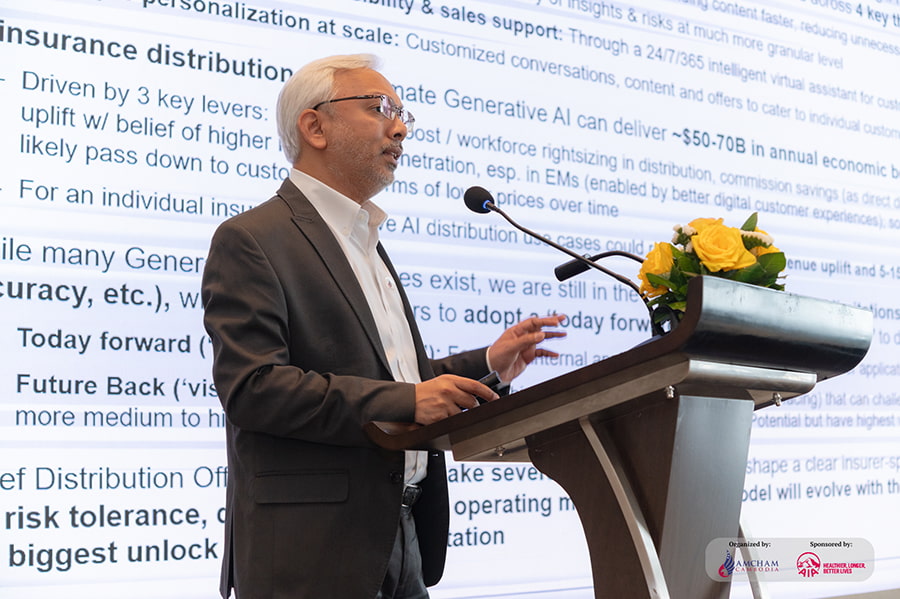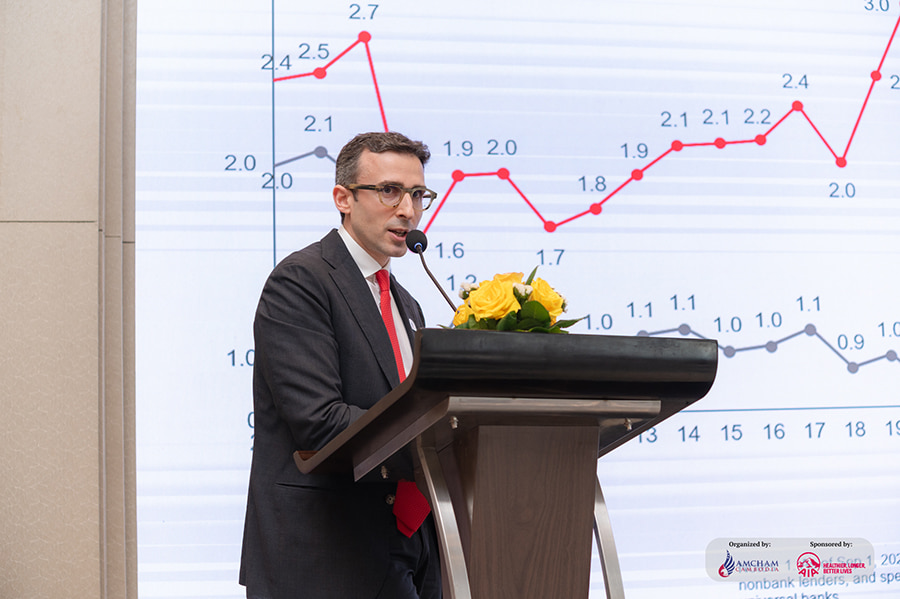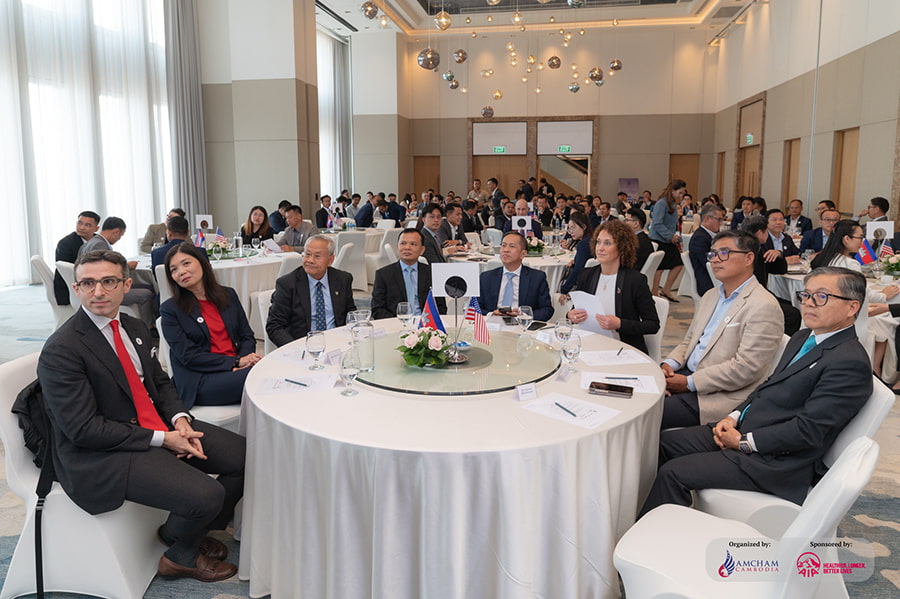Experts have routinely emphasised the profound impact of artificial intelligence (AI) on the future of all businesses and workplaces, including in the provision of bancassurance services. While this technology presents opportunities for growth, there are also challenges and risks to overcome.
During the American Chamber of Commerce (AmCham) in Cambodia’s workshop on ‘The Future of Bancassurance in Cambodia’ held on March 5, 2024, B2B Cambodia had the opportunity to interview Mohan Jayaraman, Partner (APAC) at Bain & Company, and Niki Landolfi, Regional Director of Group Partnership Distribution at AIA Group, on their presentations centred around Generative AI (GenAI) for value creation in wealth management and insurance.
What Is The Potential For Value Creation In Insurance Distribution With Artificial Intelligence?
During his presentation, Jayaraman discussed how the latest developments in GenAI point to something of an “iPhone moment” in the technology’s development, particularly due to its increasingly “human-like intelligence”. The technology is also rapidly becoming a top priority for businesses worldwide.
We are seeing a fundamental shift in the way AI is evolving. The key point that I want to make is that this capability is coming together with very human-like intelligence, and it’s something that's likely to cause a fundamental shift in the way businesses are using the technology to get value and productivity out of it.
In the realm of insurance distribution, Jayaraman asserted that GenAI has the potential to generate annual economic benefits of USD $50 to 70 billion for insurers and customers globally. He added that individual insurers implementing GenAI in their distribution processes can potentially experience a revenue uplift of 15 to 20 per cent and save between 5 to 15 per cent in personnel costs.

Jayaraman summarised the value creation potential of integrating AI into insurance distribution under four key points:
- Distribution workforce/agent productivity boost: Generating and finding content faster, reducing necessary human interactions via automation.
- Better business insights and decisions: Discovery of insights and risks at a much more granular level.
- Improved customer accessibility and sales support: Through a 24/7, 365 day intelligence virtual assistant for customers.
- Hyper personalisation at scale: Customised conversation, content and offers catered to individual customers needs.
“Technology fundamentally changes operating models and there have not been many inflections in the past since the introduction of the internet,” said Jayaraman, during his interview with B2B Cambodia.
He explained that when the internet was first introduced to the public, companies around the world were able to leverage its capabilities to bring down the cost of electronic distribution to almost zero. Jayaraman predicts GenAI will have a similar effect.
What we are now seeing is the ability to bring knowledge tasks, these incremental costs of knowledge, down to almost zero, which is a fundamentally different way of thinking about how you will do new things, knowledge tasks within an organisation. So through the lifecycle and through various processes we’re certainly going to see tremendous impact coming from the technology that will play out in the next few years.
What Factors Are Pioneering The Future Of Bancassurance?
Landolfi delivered a presentation on four key factors ‘pioneering’ the future of bancassurance, particularly highlighting the importance of digitalisation and customer-centric approaches:
- Tech and Al as a core engine to re-imagine the future of financial services: Navigating a world that's rapidly being transformed by technology is not a new challenge for companies, but it is an increasingly pressing one that has the power to accelerate growth across the industry.
- Customer engagement to shape winners in modern financial services: While traditional financial service players have been convenient one-stop shops, evolution in customer engagement is needed to match the tech-driven pace of change in other industries.
- Hyper-personalisation at scale will transform the future bank customer experience: GenAI enables an ever-higher level of hyper-personalisation, with use cases across the customer lifecycle. Banks, and financial services players more generally, will leverage GenAl's conversational capabilities to enable low-fiction journeys and intelligent engagement, powered by an analytics-led decisioning layer.
- Importance of health and wealth integration in the Invest & Insure platform to drive engagement: Customers are demanding similar attributes from insurance and wealth providers – high-quality advisors, cutting-edge digital tools and fit-for-purse products – underlining the opportunities and merges between health and wealth.

Elaborating more on customer engagement and enabling hyper-personalisation through GenAI, Landolfi told B2B Cambodia that instead of simply engaging with customers at the point of sale, new focus should be placed on engaging with customers earlier in the buying process, even before they consider purchasing a product.
“This really means going beyond just broadcasting messages, going beyond engaging with the customer at the point of sale… but rather engaging with customers at the top of the funnel where [they are] not even thinking about purchasing the product, this really increases share of time, share of mind and eventually share of wallet,” he said.
Mitigating AI Risks and Leveraging New Technologies In Cambodian Businesses
Landolfi further emphasised the importance of contextualising the use of new technologies and considering the market's maturity level when adopting AI.
I don't want to paint too much of a rosy picture as there are challenges and risks associated with going too far in the AI spectrum. We always have to be very careful about putting things into context.
He proposed that to mitigate risks, organisations should start small with confined proof-of-concepts, as well as to engage in regular discussions with regulators.
“Perhaps start very small as an organisation, with a small and confined proof of concept, and test, learn and socialise these ideas with regulators. It will surely be a journey, but if we never start with it, we'll never make progress,” Landolfi stressed.
In terms of how businesses in Cambodia can adequately leverage new technologies, Jayaraman further broke down a "today forward” and “future back” strategy for prioritising AI applications:
- The "today forward" approach refers to immediate priorities, such as focusing on internal applications and selecting low-risk customer applications with a "human in the loop" to mitigate risks.
- The "future back" approach refers to a vision for the future, focusing on high-value applications, especially those that directly engage customers. These applications have the potential to challenge the added value of human involvement and fully automate medium to high complexity tasks.
"These applications may take longer to achieve their full potential but offer the highest value,” asserted Jayaraman.
In preparing for the adoption of AI, he emphasised the importance of being open to learning and embracing new skills. Jayaraman noted that technology is becoming more democratised, meaning that it is no longer necessary to have extensive coding knowledge to leverage its capabilities.
“The thing that you will need to think about as you're looking ahead at your career is some of the new opportunities that are coming up in areas like product management, prompt engineering and managing customer experiences. Try to see what is the best way you can harness the technology for value. Think about each of these as opportunities and think about what skillsets you need to build upon them, and perhaps that can be the right path ahead for you,” he concluded.
